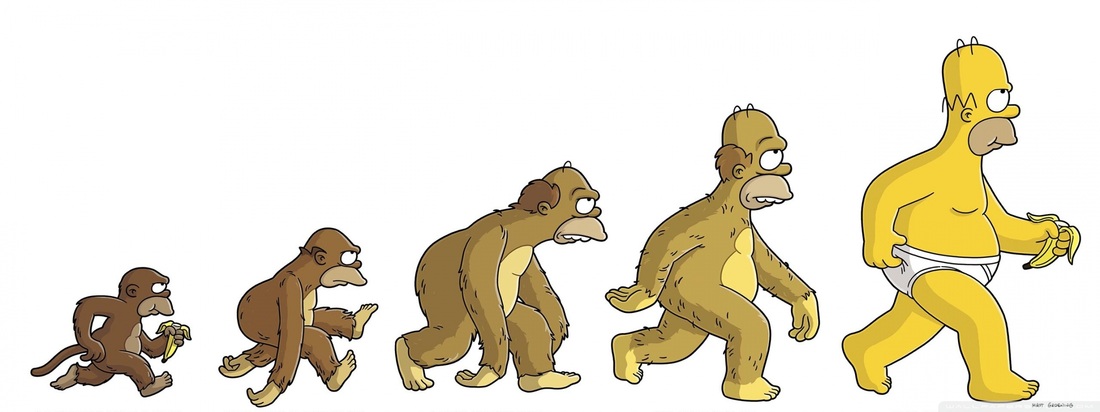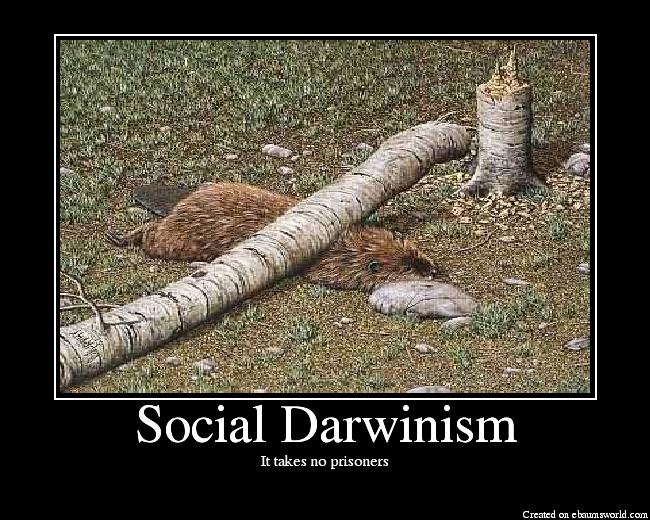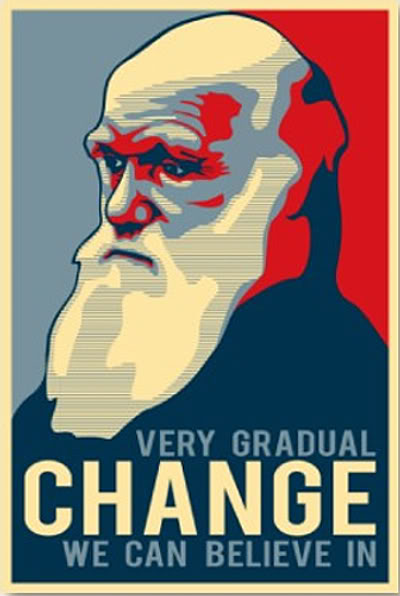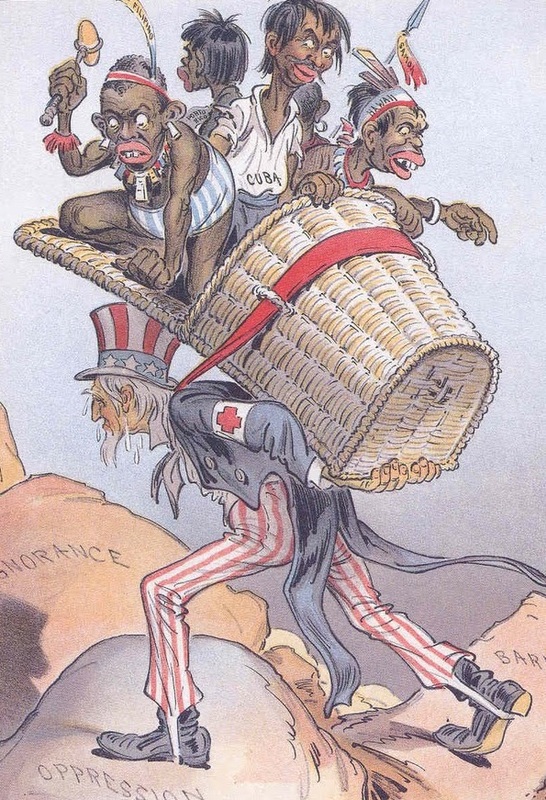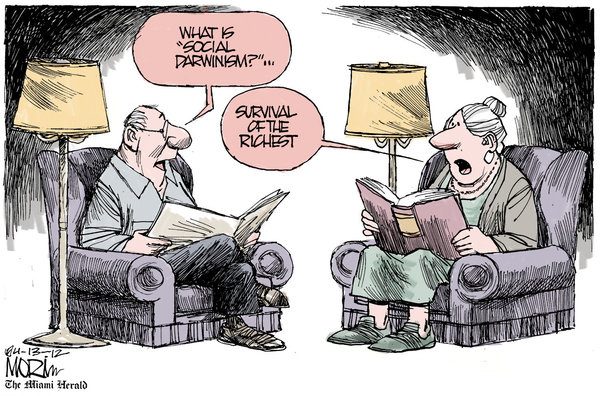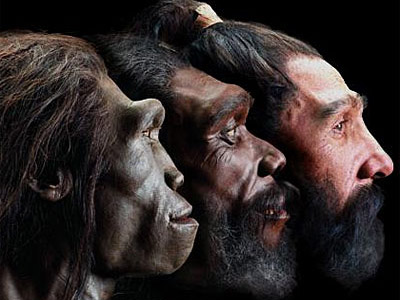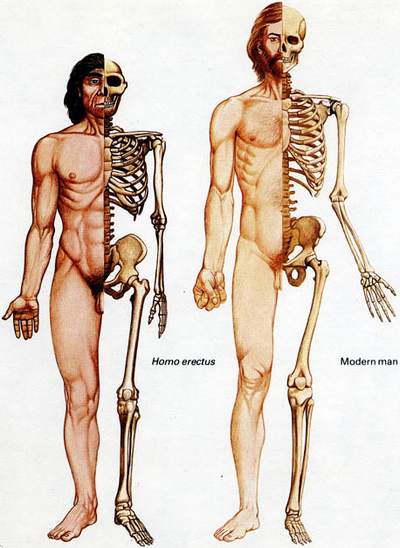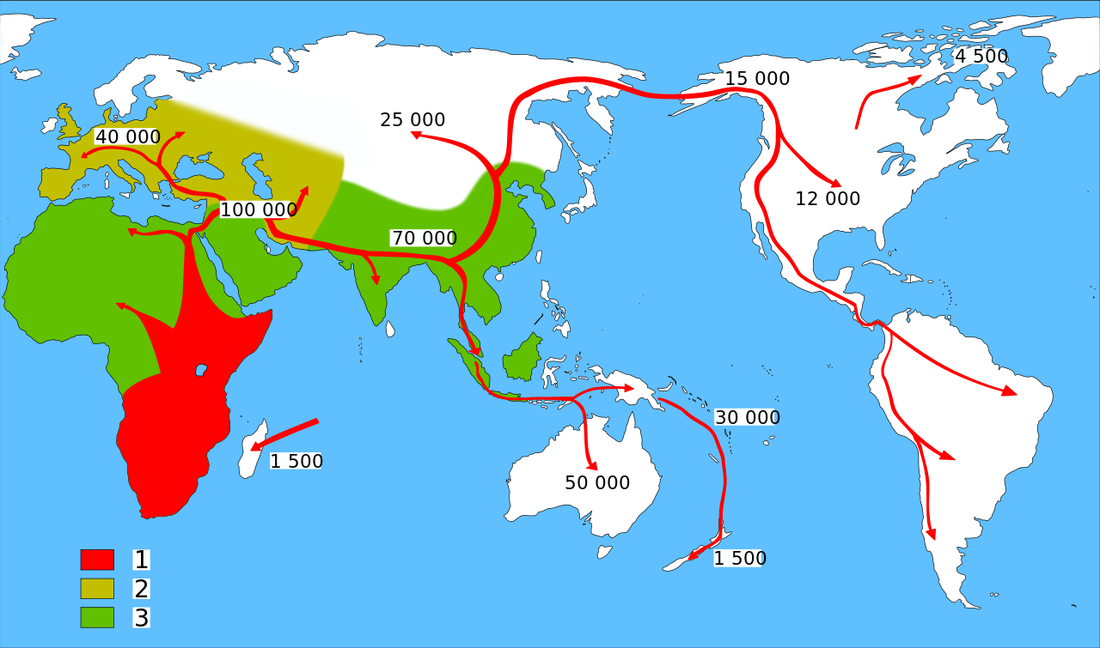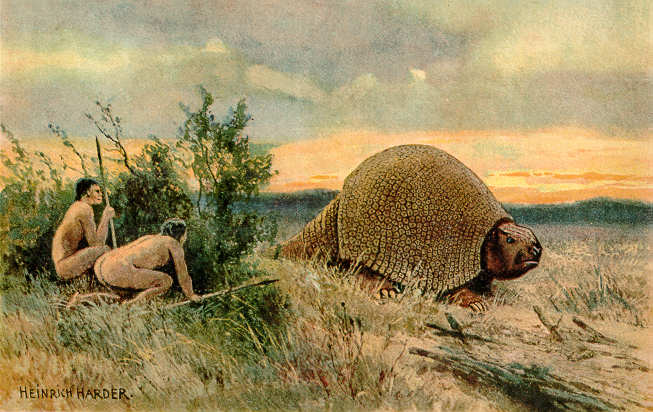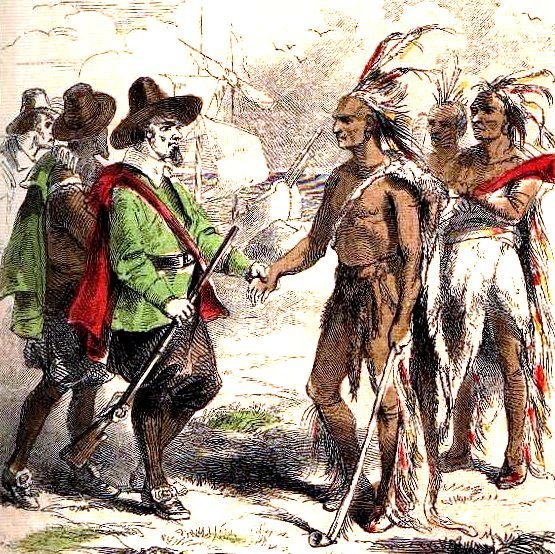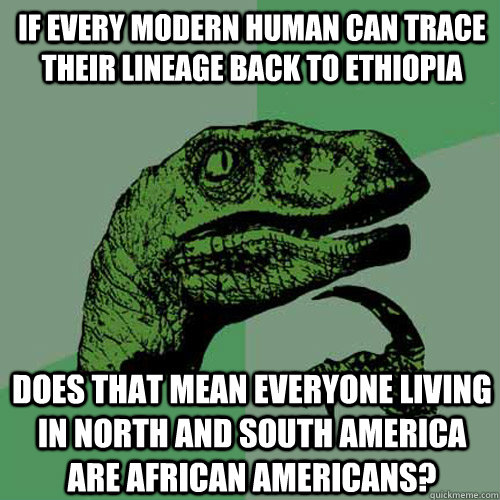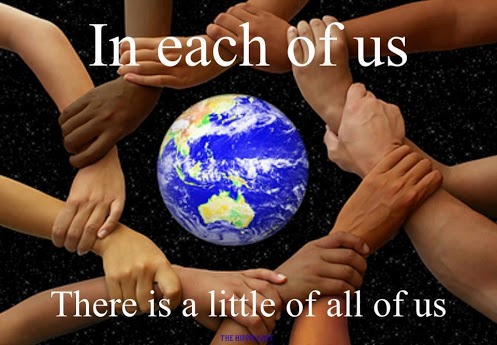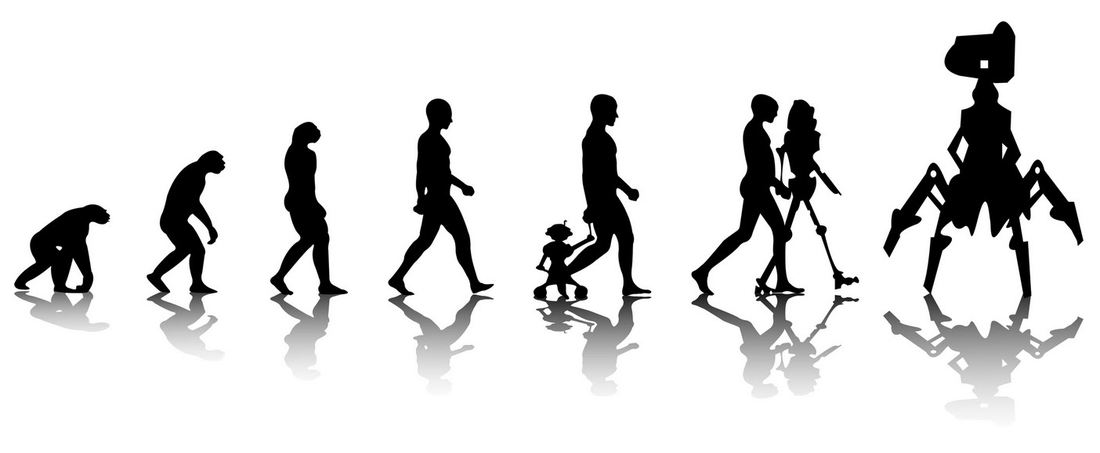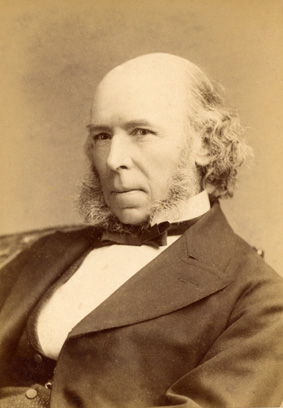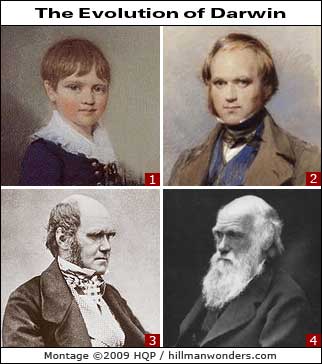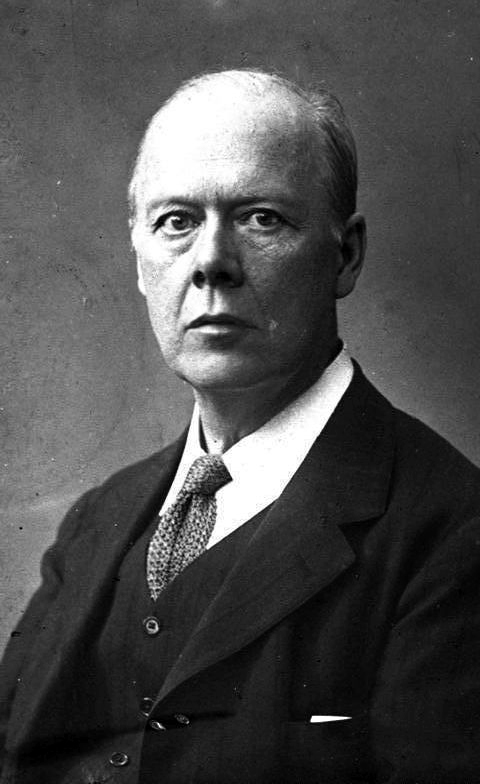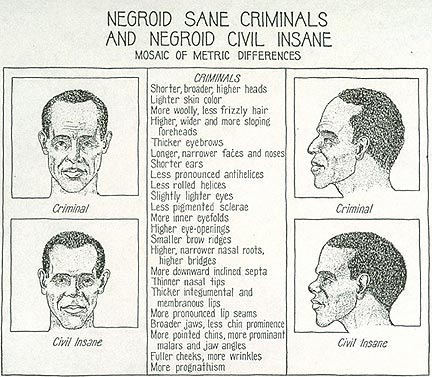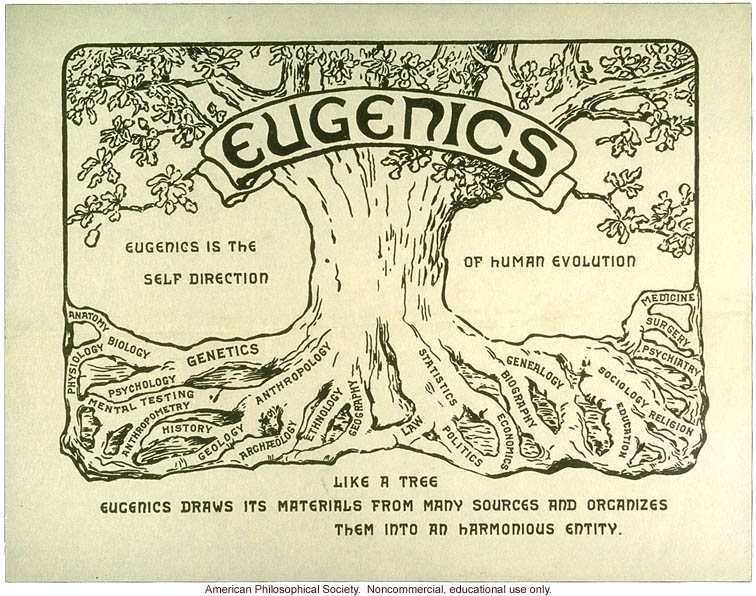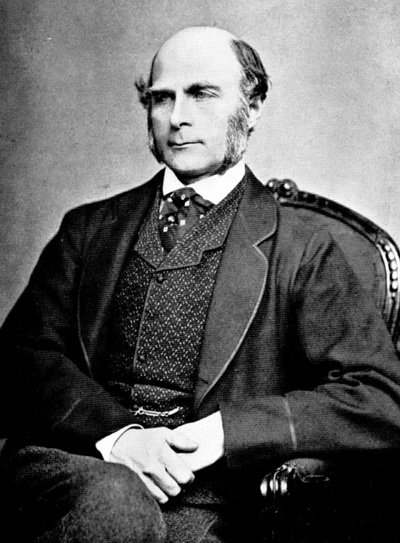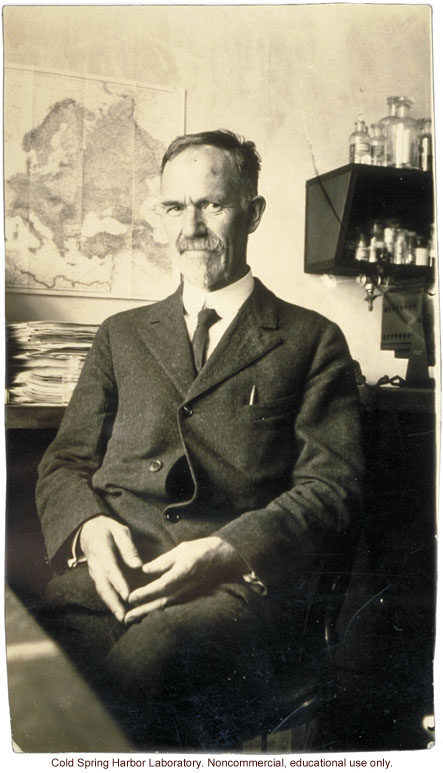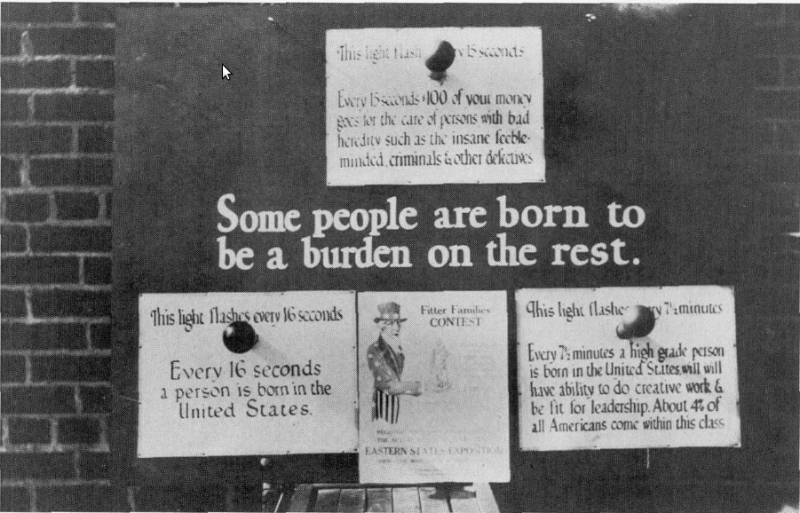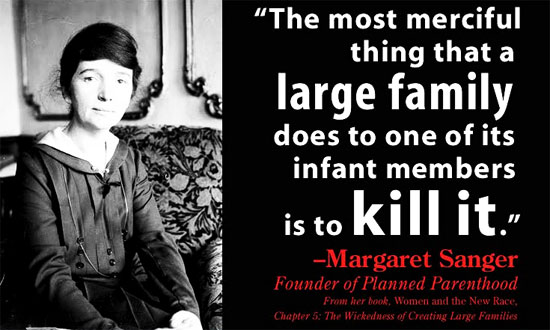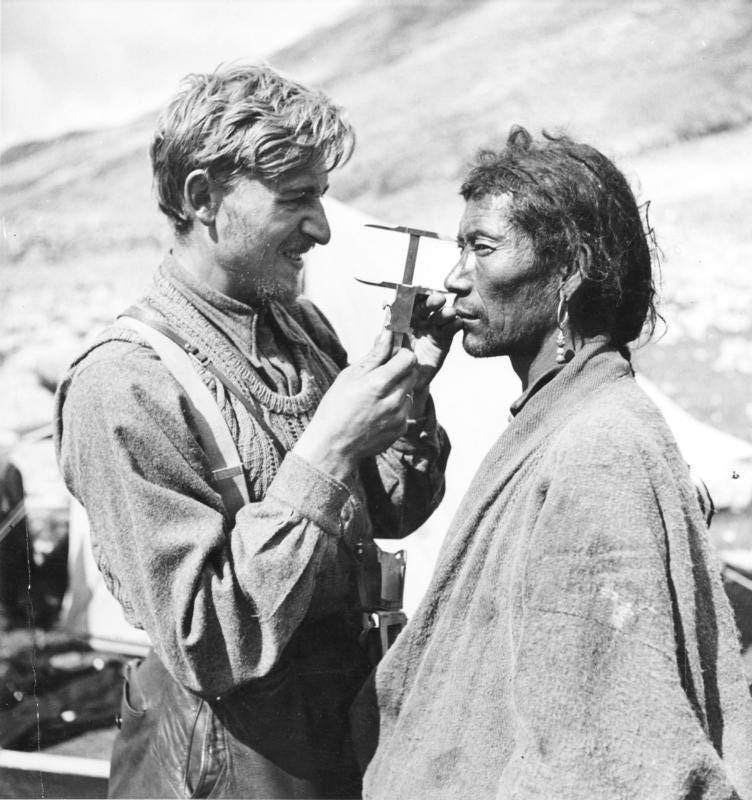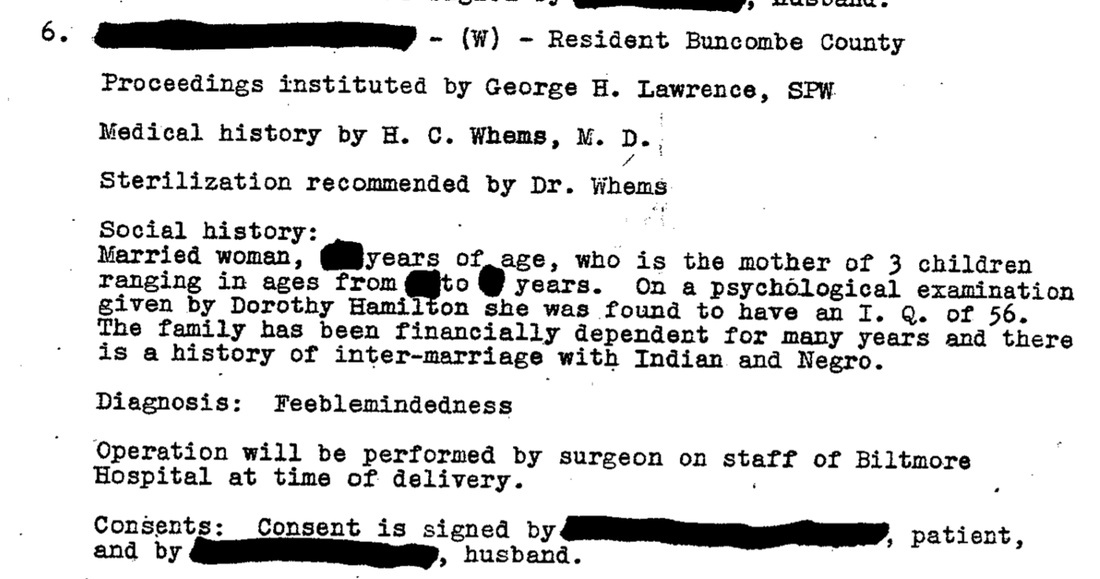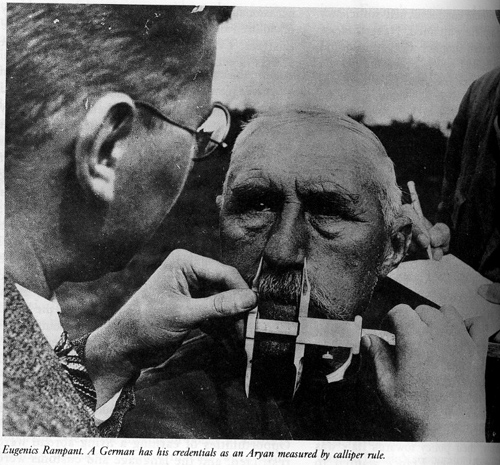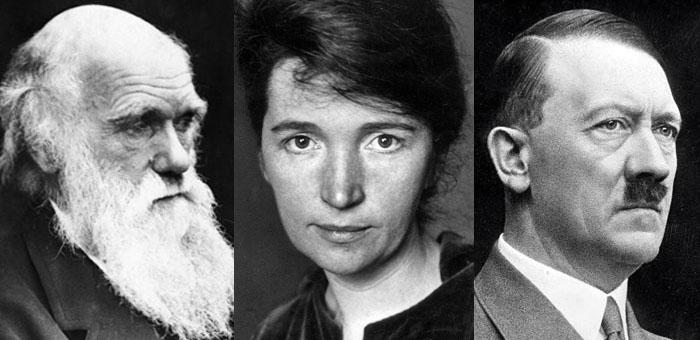Scramblin' thru... Social Darwinism
Imperialism + Darwinism = Problems...
|
Of the four causes behind imperialism (reactive, ideological, power, and economic), ideological is the most controversial because it is based on one country's "ideas". When these ideas include government (political), culture, and religion, there is often open resistance. Ideological imperialism could be found in the reasons for expansion during any age, but it was never more prevalent than it was during "New Imperialism"
(1870-1914). As such, it should come as no surprise that imperialism during this time was directly tied to racism
and Social Darwinism.
Racism is the belief that a person's race determines his/her traits and capabilities. Racists believe that some races are superior or inferior. Social Darwinism was a term that describes the idea that humans, like animals and plants, compete in a struggle for existence in which natural selection results in "survival of the fittest". Social Darwinists base their beliefs on theories of evolution developed by British naturalist Charles Darwin. Social Darwinists typically deny that they advocate a "law of the jungle", but most propose arguments that justify imbalances of power between individuals, races, religions, and countries because they consider some people "more fit" to survive than others. Many Europeans believed they had a moral responsibility to civilize "primitive" people, like those in Africa. They called this responsibility the "White Man's Burden". Because it morally justified their actions, they unfairly portrayed Africa as a primitive continent with "no discernible record of historical achievement" (you know, not counting that civilization along the Nile that lasted for 3,000 years...) European powers claimed they had come to suppress the slave trade, end warfare, and establish their own right to trade freely in the continent without local interference. For others, this meant bringing Christianity to Africa. Some saw it as a chance to take the "benefits" of capitalism and democracy to these countries... whether they wanted it or not. The mixing of imperialism with Social Darwinism proved lethal. Adhering to a belief that there are groups of people that are "less evolved" and inferior to others paved the way for a century of genocide. As a result, millions died because their race, class, religion, or disability made them "expendable" to the growing empires of New Imperialism. |
|
|
Is
everyone in the world... related?
Yup. Here me out on this one... In paleoanthropology, which is the study of ancient humans as found in fossil evidence (essentially paleontology and anthropology together), the "Out of Africa" theory is the most widely accepted model of early migration of anatomically modern humans. (Anatomically means they look like us.) Genetic studies and fossil evidence show that Homo sapiens evolved (ahhh! You said the "e" word!) into anatomically modern humans in Africa somewhere between 200,000 and 60,000 years ago. The oldest fossil remains of anatomically modern humans are the Omo remains in Ethiopia, which date to 195,000 years ago and include two partial skulls as well as arm, leg, foot, and pelvis bones. Members of one branch of Homo sapiens left Africa between 125,000 and 60,000 years ago, and this movement occurred in one, two, or three waves. Of the proposed theories concerning the routes out of Africa, the Sinai Peninsula (the triangular-looking part of Egypt) makes the most sense because it connected Africa to the Middle East. It has been estimated that of a population of 2,000-5,000 individuals in Africa, only a small group (as few as 150 to 1,000) made the journey. From the Middle East, some of these humans spread east to South Asia some 50,000 years ago while others went into Europe 40,000 years ago. The South Asian humans next settled in India before hitting Australia at around the same time as their "brothers" were colonizing Europe's west coast. East Asia (including Korean and Japan) was reached 30,000 years ago. Crossing into North America is estimated to have occurred between 30,000 and 14,000 years ago. And once across, these humans had full run of North, Central, and South America. Of course, details about the movement of the Paleo-Indians (the name given to the humans in the Americas), including the dates and routes taken, are subject to ongoing debate. Got that? If not, let's summarize: The first humans developed in Africa. They then migrated into the Middle East. From there, they went into Europe or into Asia. The Neolithic Revolution (8,000-7,000 BC) in Southwest Asia turned these roamers into settlers and farmers, which sprouted up civilizations in Mesopotamia, Egypt, India, and China. So, if the people that eventually populated Europe came up out of Africa and hung out for awhile in the Middle East, it technically makes all Europeans "African" and/or "Arab". It gets better... During the Ice Ages, much of Earth's water was trapped in glaciers. As a result, the sea levels dropped, creating a land bridge between Alaska and Siberia (called the Bering Land Bridge). Asians walked across it and became the first human inhabitants of the Americas. When the last glaciers receded 10,000 years ago, ancestors of these first Americans (the Paleo-Indians) filled nearly all of the habitable parts of North and South America. Because the early humans in Asia crossed the land bridge into North America, this technically makes all Native Americas... "Asian". So, when the Europeans came to America, they ran into... themselves (from a parallel-universe). What does this mean? Brothers from another mother, baby! It means every human is a mix of African, Arab, and Asian cultures. So we can drop all that "one race is superior to another" nonsense. I mean, how can we be superior... to ourselves?! Now we just need to get "African Arab-Asian" as an ethnic selection on standardized tests... |
|
"Survival of the fittest" is a phrase that originated in
evolutionary theory as an alternative (but less accurate) way of describing
natural selection. It is used today to refer to the idea that "fit" individuals
will survive over "unfit" individuals. Herbert Spencer, a British philosopher and self-proclaimed "Renaissance Man", first used the phrase after reading Charles Darwin's 1859 groundbreaking work On
the Origin of Species. (Darwin's book housed much of the research he recorded while visiting the Galapagos Islands off the coast of South America in 1831.) Spencer's book, Principles of Biology (1864), drew
parallels between his own economic theories and Darwin's biological ones. In it, he
wrote: "The survival of the fittest
is that which Mr. Darwin has called 'natural selection', or the preservation of
favored races in the struggle for life." (Spencer's addition of the
word "race" opened the floodgates for wild interpretations and applications to
the human existence. No shocker, though. He was British. They were kinda
running the world then...) Darwin, in turn, first used Spencer's new phrase "survival
of the fittest" alongside "natural selection" in the fifth edition of On
the Origin of Species (1869), intending it to mean "better
designed for an immediate, local environment". (Darwin's use was far less, well, racist.)
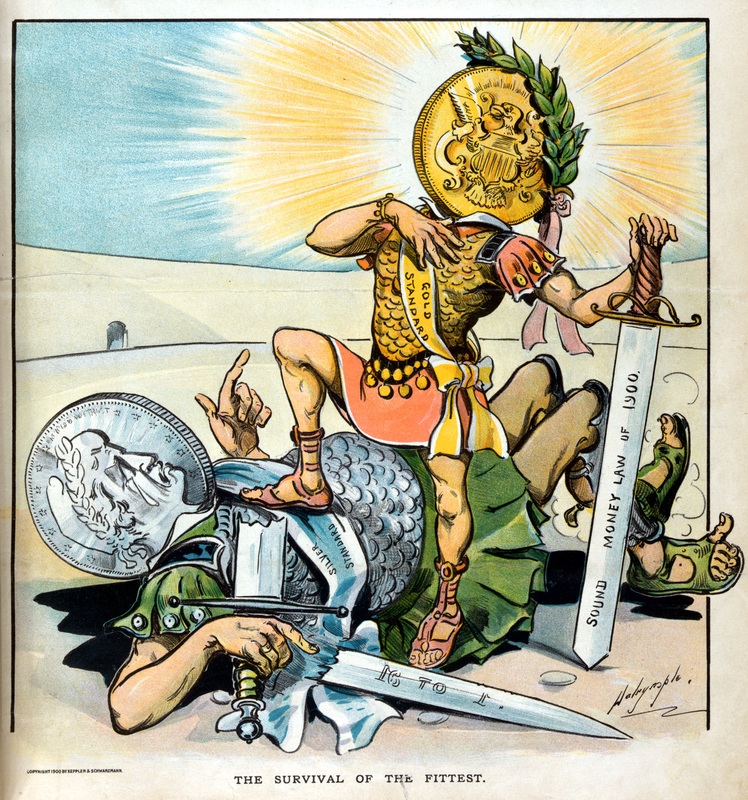
In this political cartoon (circa 1900), the phrase "survival of the fittest" is applied to the debate (at that time) over using gold or silver to back U.S. currency. Judging by the picture - and as history played out - the gold standard was victorious. (Of course, the U.S. dropped backing its money with any precious metals during the Great Depression.) [Click picture for a larger version.]
|
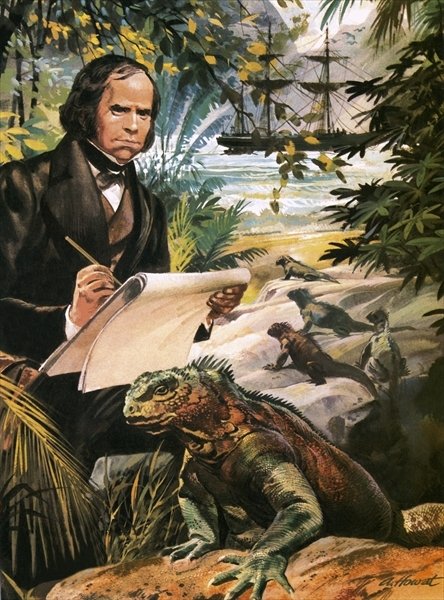
During his visit to the Galapagos Islands, Darwin noted that while the creatures were similar from island to island, they had perfectly adapted to their specific environments. His findings later drastically (and controversially) altered the scientific view on the biological origins of life... and made science teachers' lives an invariable hell. [Click picture for a larger version.]
|
|
|
Sometimes extreme nationalism was combined with racism. In Germany (I know, enough said, right?), Houston Stewart Chamberlain (a British author who later became a German citizen after World War I) believed Germans were the "pure successors" of
the Aryans and that Jews were the enemy. Political parties arose in the 1880s
and 1890s that used anti-Semitism
(hostility toward Jews) to win votes. In Eastern Europe, where 72% of the
world's Jews lived, pogroms (or organized massacres) were widespread. The culminating event was the Holocaust.
By the 20th Century, thousands of Jews decided to emigrate to the U.S. or to Palestine, the land of Ancient Israel. Soon, a nationalist movement known as Zionism began to unite all Jewish people of the Diaspora (exile) and settle them in Palestine. The movement’s name came from Zion, the hill on which the Temple of Jerusalem was located. Zionism culminated in 1948 with the creation of the country of Israel. Today, radical Zionism is heavily opposed by many in the Muslim world, including Palestinians. Some Jews are fearful of it because "it constitutes a danger, spiritual and physical, to the existence of our people" and, like jihad in Islam, applies only to extreme and fringe sects of the religion. |
|
Eugenics
is a belief and practice of improving the genetic quality of the human
population. (Wow! Every word in that
sentence is a landmine of problems!) Although the idea of eugenics (but not the term)
is contained in the Greek philosopher Plato's Republic, the modern concept became prominent during the second
half of the 19th Century. Its predecessor was the group of sociological
theories known as Social Darwinism. The favorite phrases of Social Darwinism
– "struggle for existence" and "survival of the fittest" - when applied to
humans in society, suggested that the rich were better endowed than the poor
and hence more successful in life. The continual and natural sorting out of "better"
and "worse" elements would, in theory, lead to continued improvement of the
human species. Eugenics differs from Social Darwinism because Social Darwinism was
characterized by its laissez-faire
attitude, that is, letting nature take its course so that the worst
elements of society were eventually be eliminated. Eugenics, on the other
hand, preaches that proper breeding is the key to bettering society. In other words, you push for the higher reproduction of people
with desired traits (called "positive eugenics") and prevent the reproduction of
those with less-desired traits (called "negative eugenics").
This can't be serious, can it? Oh, it is. The modern eugenics movement was closely associated with a sense of white Anglo-Saxon superiority. Sir Francis Galton (Charles Darwin's cousin), the founder of the English eugenics movement, for example, had been drawn to the study of human heredity and eugenics by his curiosity about what he called the hereditary "genius" in his own family... as in, "Damn, we're a smart bunch. We should be breeding more." (I'm guessing his knighthood went to his head.) The publication of Darwin's The Origin of Species in 1859 was an event that changed Galton's life. He became obsessed with the first chapter about the breeding of domestic animals (um, what?) and devoted the rest of his life to exploring the variations found in the human population. In so doing, he established a research program which categorized multiple aspects of humans, from mental characteristics to height; from facial images to fingerprint patterns. In 1883, a year after Darwin died, Galton took the Greek root words for "good" and "origin" and named his research "eugenics". As a social movement, eugenics reached its greatest popularity in the early decades of the 20th Century. By this point, eugenics was practiced around the world and promoted by imperialist governments. Many countries enacted eugenic policies, including genetic screening, birth control, marriage restrictions, segregation (both racial segregation and segregation of the mentally ill from the rest of the population), forced sterilization, forced abortions, forced pregnancies... and genocide. The movement was especially strong in England, the U.S., and Germany from 1910-1940. In the U.S., the eugenics movement received extensive funding from major corporations, including the Carnegie Institution and the Rockefeller Foundation. Even the inventor of corn flakes, J. H. Kellogg, launched the Race Betterment Foundation in Battle Creek, Michigan. (Yea, now your cereal tastes like shame! But trust me, that was one weird dude. Real the caption under his picture. And then go eat some cereal...) Renowned biologist, Charles B. Davenport, organized the Eugenics Record Office in New York and the American Breeder's Association (ABA). He formed the ABA specifically to "investigate and report on heredity in the human race, and to emphasize the value of superior blood and the menace to society of inferior blood." One of the ABA's biggest members was Alexander Graham Bell. (Yea, now your phone sounds racist.) Eugenics exerted considerable influence on popular opinion and was reflected in some state and Federal legislation. Starting with Indiana in 1907, 31 states passed sterilization laws aimed at breeding out various social "misfits": the mentally retarded, criminals, and the insane. (Indiana was the first, California conducted the most, and North Carolina was the most aggressive: an IQ lower than 70 meant sterilization was appropriate.) Laws were also passed restricting marriages between members of various racial groups. Even the National Federation of Women's Clubs, the Women's Christian Temperance Union, and the National League of Women Voters were among major feminist organizations that lobbied in favor of eugenics, specifically birth control and sterilization in order to prevent unwanted children from being born into poverty and to curb passing on mental diseases or birth defects. However, Margaret Sanger, the founder of Planned Parenthood, made it abundantly clear that it was a woman's decision – and not the state – whether or not to have a child. (Some see this as the start of the Pro-Choice Movement.) The key triumph of the U.S. eugenics movement came in 1924, when a coalition of eugenicists and some big-business interests pushed through the Immigration Act of 1924, also known as the National Origins Act. The act severely limited immigration into the U.S. from Eastern European and Mediterranean countries. Eugenicists claimed that these immigrants were inferior to Anglo-Saxons (whites) and were "polluting" the "pure" American bloodstream. By 1928, there were 376 courses in some of America's leading universities, enrolling more than 20,000 students. After the eugenics movement was firmly in place in the U.S., it spread to Germany. Eugenicists in California began producing literature to promote eugenics and sterilization and sent it to German scientists and medical "professionals". By 1933, California had subjected more people to forced sterilization than all other U.S states combined. (Most were poor, sick, and non-white.) The sterilization program engineered by the Nazis was inspired by California's. But wait... it gets worse. The Rockefeller Foundation helped develop and fund various German eugenics programs, including the one that Josef Mengele worked in before he went to the concentration camp Auschwitz. (Mengele was the notorious Nazi doctor that performed horrific experiments on people.) Upon returning from Germany in 1934, where more than 5,000 people per month were being forcibly sterilized, the California eugenics leader C. M. Goethe bragged to a colleague: "You will be interested to know that your work has played a powerful part in shaping the opinions of the group of intellectuals who are behind Hitler in this epoch-making program. Everywhere I sensed that their opinions have been tremendously stimulated by American thought. I want you, my dear friend, to carry this thought with you for the rest of your life, that you have really jolted into action a great government of 60 million people." After World War II, however, historians began to portray U.S. eugenics as different from Nazi eugenics. (Of course they did!) The movement in the U.S. was largely discredited by the fact that eugenics was central to both the theory and practice of Nazism. Still, California continued forced sterilizations on prisoners as late as the mid-1960s, mostly because California's long-time attorney general was a big supporter of the practice, and it wasn't formally outlawed there until 1979. (In fact, from 2006-2010, 148 women were illegally sterilized in California's prisons.) Eugenics is rightfully and severely criticized for what can be called overt racial bias, subjectivity in the use of evidence, and lack of scientific "proof". Eugenics is a shameful reminder of what happens when science mixes with racism. But don't worry. You can sleep on this fun fact: eugenics is still officially permitted in the U.S. today. WHAT?! 
Wir stehen nicht allein: "We do not stand alone". This is a 1936 Nazi propaganda poster that supports Nazi Germany's 1933 compulsory sterilization law. The couple is in front of a map of Germany, surrounded by the flags of nations, including the U.S, which had enacted or were considering similar legislation. [Click picture for a larger version.]
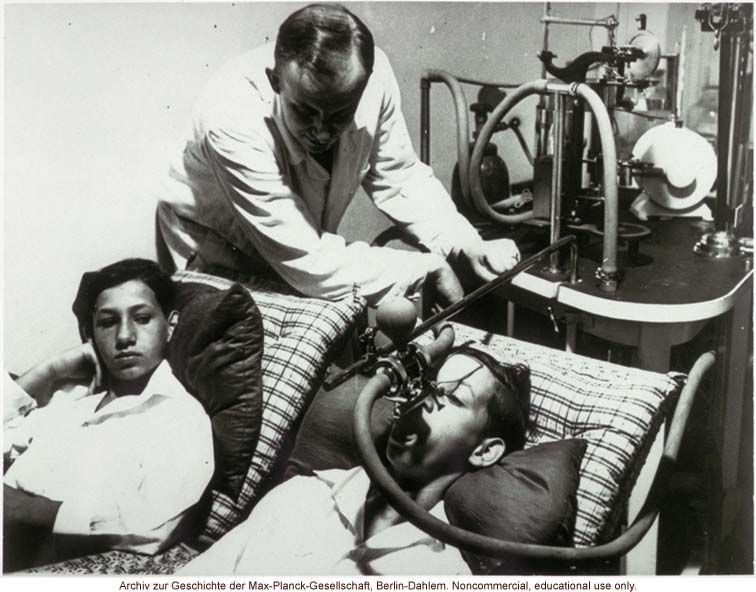
Although experiments were performed on all kinds of people at Auschwitz, twins were targeted directly. Dr. Josef Mengele performed heinous experiments on identical and fraternal twins of all ages to learn about genetic traits, hoping to unlock how to multiply the Aryan race via the birth of twins. [Click picture for a larger version.]
|
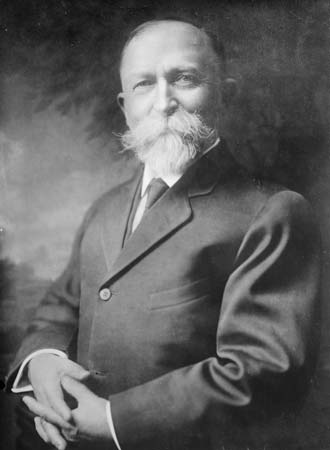
The Michigan physician J. H. Kellogg was a huge supporter of eugenics... and one of the most ardent anti-masturbators. He believed that sex with your wife was bad, which is why he never consummated his marriage and adopted all of his kids. Kellogg’s solution to the need to masturbate... was a healthy diet. While working at Michigan’s Battle Creek Sanitarium (which was plagued with masturbators), he invented corn flakes. And just like that, people everywhere stopped masturbating and instead ate corn flakes. (Well, not realty. But now people had more energy to masturbate...) Kinda takes some steam out of that morning breakfast, doesn't it? [Click picture for a larger version.]

Mary deGormo, a former teacher, was the first to combine ideas about health and intelligence standards with competitions at state fairs... in the form of "Better Baby" contests. She developed the first in 1908. Scoring was based on a deduction system in that every child started at 1,000 points and then lost points for having measurements that were below a designated average. The child with the most points (and the least defections) was ideal. [Click picture for a larger version.]

First appearing in 1920 at the Kansas Free Fair, "Fitter Family" competitions continued until WWII. There were many categories that families were judged in: size of the family, overall attractiveness, and health. All of these categories were clear indicators to determine the likelihood of having healthy children. (Riiiight.) The family shown here won one of the "Fitter Family" contests. [Click picture for a larger version.]
|

